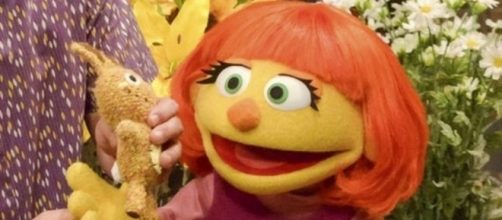“Sesame Street” believes that variety is the spice of life and, to prove the point, will introduce a new character next month. She is 4-year-old Julia, a female muppet who is autistic. The objective is to expand the Autism initiative through the medium of television and, her debut is scheduled for April 10. In one of the YouTube videos, she appears as a shy and winsome 4-year-old, with striking red hair and green eyes. Julia likes to paint and pick flowers and, when she speaks, she likes to repeat what she has just heard – that is what her friends Abby and Elmo say.
She's a shy and winsome 4-year-old, with striking red hair and green eyes. Julia likes to paint and pick flowers. When Julia speaks, she often echoes what she's just heard her friends Abby and Elmo say.
Preparations for the launch
The TV show has done preliminary work to keep the audience interested. It has announced the arrival of Julia on its website and has, also, taken the help of YouTube to release some videos involving the new entrant. From the videos, it is seen that she loves to sing and has a fantastic memory – her ability to memorize lyrics is better than many others. However, she is uncomfortable with loud intensity noise like that of sirens which leave her emotionally upset.
New York Times reports that Julia was first introduced by “Sesame Street” in a digital storybook in the fall of 2015.
At that time, Jeanette Betancourt, Sesame Workshop’s vice president, had clarified that the creators of Julia made the muppet to break the prevailing myth that autism is seen only in the males.
Understanding those with autism
The arrival of Julia on the scene is expected to provide new insight into this sensitive issue. Sesame Workshop is a nonprofit organization that puts out “Sesame Street, ” and it has said that to create awareness about autism, it would expand related offerings through new videos, e-books, and books in both English and Spanish.
Incidentally, autism is a type of disorder that affects the nervous system and, those affected face difficulties in communicating their thoughts with others. If detected in the early stages, therapies can help to reduce the symptoms and, extend support to development and learning of the individual.

